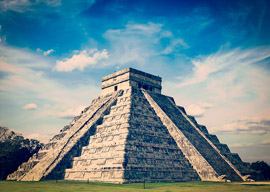
May 25, 2016

Temple of Kukulcan
Source: Bigstock
If this threat was ever valid, is it still true? Nobody seems to know. Perhaps Mexico is wealthier and more stable today? After all, since cocaine kingpin Pablo Escobar was killed in Colombia in 1993, Mexico has enjoyed two decades of vast earnings from dominating the smuggling of drugs into the U.S.
You might think that this question of what would happen in Mexico would be a subject of intense concern to American elites. Instead it doesn”t really seem to come up much.
One reason that nobody in the U.S. pays attention to Mexico is because Mexican elites have wanted it that way.
Anti-Americanism is the oldest Mexican political tradition for the understandable reason that the “Colossus of the North,” which has reduced so many Central American countries to banana republics, is naturally perceived as a threat to continued rule by Mexico’s elites. It’s not just aggression that worries Mexico’s top dogs, but the greater all-around competence of American culture.
While President Carranza a century ago pondered Germany’s offer in the Zimmermann telegram of “generous financial support…to reconquer the lost territory in Texas, New Mexico, and Arizona,” more recent regimes have preferred a passive-aggressive response to America’s dominance. Mexican politicians lack the stubborn audacity of Fidel Castro.
Mexico, with its superb real estate (much of the country is at high enough altitude to enjoy a mild climate), is vulnerable to Americans simply inundating the place in pursuit of retirement and vacation homes. It always made more practical sense for American baby boomers desirous of cheap servants to retire to Mexico than to import millions of Mexicans into America.
But that largely hasn”t happened because life in Mexico isn”t attractive enough to many Americans.
In a book a half decade ago, Castañeda offered a long list of reforms that would make Mexico more appealing to American retirees, from lifting the ban on foreigners buying beachfront property to installing more traffic signals to make crossing the street less harrowing.
Most important, he asked that Mexicans stop referring to Americans with the ethnic slur “gringos.” Americans don”t care about Mexican anti-Americanism, but, Castañeda pointed out, the epithet discourages Mexicans from learning from Americans how to better run their country.
Castañeda’s recommendations weren”t very popular at home, however.
Instead, Mexicans have largely forestalled the potential American influx by keeping Mexico cruddy. Their inept infrastructure, pollution, noise, and high accident rates have gotten across the message that while Mexico is an okay place to visit, you wouldn”t want to live there.
The most striking symbol of this is the continuing confusion over whether or not it’s safe to drink the water in Mexico (roughly a century after the U.S. achieved safe municipal drinking water).
Of course, Mexicans themselves pay a huge price for their various manifestations of public incompetence. For instance, Mexicans drink more bottled water than anybody else in the world, 234 liters per person annually, more than double what even rich Americans consume.
All this is a price they appear willing to pay. Why? Because Mexicans like having their own country.
In turn, is that too much for Americans to ask?